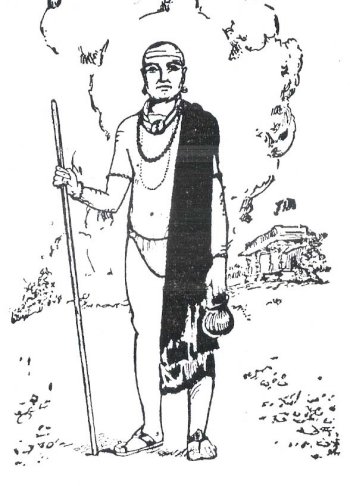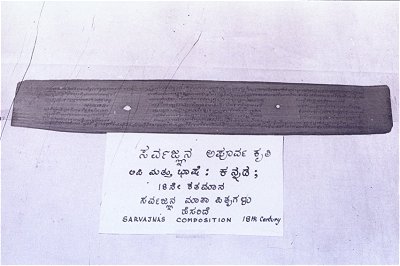Saint Poet Sarvajna
by Dr. Jyotsna Kamat
First Online: May 18, 2013
Page Last Updated: December 07, 2024
Sarvajna (C 17th century CE) is like Tiruvalluvar in Tamil, Kabir in Hindi, Tukaram in Marathi, Vemana in Telugu, a common man's poet in Kannada. Prof. A.R. Krishna Shastri has noted his prominence in Kannada moral literature. He had the rare ability to fill aspects of worldly wisdom in very short and 3 sentences or triplet known as tripadis. Tripadis have entertained the masses through puns and humour at the same conveying universal message in pithy sentences. There is no human aspect Sarvajna has not touched. Religion, philosophy, mythology, geography, and society in all its freakishness, food, clothing, health, hygiene, medicines, vices, need for disciplined life and other innumerable social vignettes are reflected in his short sayings.
kamat.com/Kamat's Potpourri
Ascetic Poet Sarvajna
Sarvajna wrote three-liner philosophical poems in Kannada
The word ‘Sarvajna' stands for "Knowing All" or ‘Wisdom Personified'. It is a title bestowed by the people on the most loved and well understood recluse of deep insight and sharp wit. A mendicant leading austere life, he was aware of all human weaknesses and gave hints for good contented life. His triplets known as vachanas (wise utterings), were sung, quoted, recited and set to kolata or play of sticks with music, as they are rhythmic.
Free translation of some of his vachanas could be noted. Becchana maneyagi Vechchakke honnagi, Ichheyanariva satiyage Swargakke Kichchu hachhenda Sarvajna. With a warm house, plenty of money and a wife who appreciates wants, the very heaven could be set fire to! ii Ella ballavarilla, ballavaru bahalilla Ballavaru iddu balavilla Sahityavellarigilla sarvajna Nobody knows everything! The knowledgeable are few, the learned ones are rare. Literature is not for all! (by "literature" (Sahitya) Sarvajna perhaps meant practical literary knowledge which helped oneself create social awareness for better living) Sarvajna condemned caste system in no uncertain terms. iii Jaati heenara maneya jyoti ta heenave? Jaati-vijati enabeda! Devanolidaatane Jaata Sarvajna. Is the shining light in the house of the low born low? Mind! There is no caste high or low. The soul loved by God is the highest born! On exploitation iv Sattuda timbatanettanada holeya? Etti jeevada koraliridu timbata- nuttamada holeya! Sarvajna.
K.L. Kamat/Kamat's Potpourri
Original Manuscript of Kannada Poet Sarvajna
18th Century, Keladi Museum Collection, Keladi
The person who eats meat of the dead animal is not an untouchable (lowly). One who exploits the living, by squeezing their life and blood is the lowest born!. Exploitation of the poor and meek was universal then as now and the Saint poet condemned it.
As is common in Indian tradition, no bio-data of Sarvajna is available. But the tradition states that his parentage was unconventional. He was born of a short but very intimate relation between Brahmin Basavarasa and a potter woman Maali! Basavarasa was returning from pilgrimage to Kashi to his village on foot. On the way one evening, he had to face a thrashing hailstorm and continued rains. The village road was deserted and he was compelled to seek shelter in a lone cottage of Malli a young single potter woman. The rains continued and the two souls spent the day and night together drawn to each other by destiny. Sarvajna is said to have been born of this untraditional parentage. It is because of this background, scholars see unusual cynicism in many of his epigrams. It is certain that Sarvajna had no formal education. A self-taught person, his encyclopedic knowledge was due to constant travel, ever keen and watchful eyes and ears as extraordinary ability to imbibe and express what he experienced briefly. One of his epigram says:
Sarvajnanembuvanu garvadindaguvane? Sarvarologondonolu nudikalitu Vidyeya parvatave Ada! Sarvajna .
Is Sarvajna made of conceit?
No! learning each
word from every body
He verily became
mountain of Knowledge!
For more than three centuries, Sarvajna's vachanas survived and prospered through people's tongue. It required the ceaseless efforts of a Christian Missionary Rev. Chennappa Uttangi, for Sarvajna to appear in book form in 1934. The Reverend, felt that the humble saint Sarvajna, practiced several precepts laid down by Jesus Christ Centuries earlier. Uttangi's early efforts to collect epigrams from palm leaves and oral tradition paid dividends.
Today several well-edited Sarvajna Vachanas which count to 2311 verses are available at one place.
A recluse, Sarvajna loved humanity at large, and was fond of the country he lived in, which he extols picturesquely. He says:
The whole town is full of relatives Streets are full of kith and kin Mother earth herself is my family GoddessWhom could I ignore? he exclaims. He lived and taught self-less life and assured that there was no want or scarcity in this prosperous land. Karadi Kappara untu! Hiridondu naduntu! Haranemba daiva namaguntu. Tirivarim Sirivantararu?
"With begging bowl in hand and a vast land around, with Hara (Siva) the beneficial, by the side, who is wealthier than a roving (mendicant) beggar?" he questioned. A timely message to the ever greedy world.
